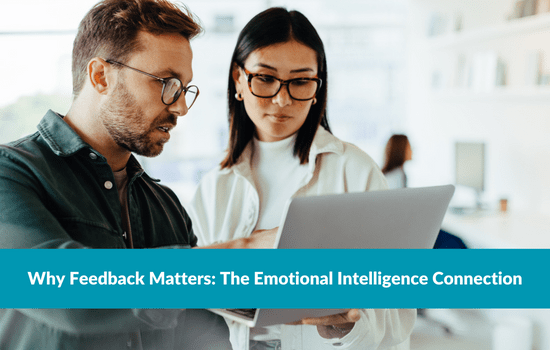Effective feedback fuels emotional intelligence, fortifies communication, and enhances relationships, creating a foundation for continuous improvement. Discover the profound impact of feedback on personal and professional growth in this blog.
Connecting the Dots between Feedback and Emotional Intelligence

In the intricate tapestry of personal and professional development, feedback emerges as a pivotal thread, weaving together insights that illuminate our strengths, spotlight areas for improvement, and unveil the nuances of our emotional intelligence. This invaluable gift transcends mere critique; it is a catalyst for growth that resonates through enhanced communication skills and fortified relationships. Join us as we delve into the profound intersection of feedback, emotional intelligence, and continuous improvement, uncovering the transformative power embedded in this dynamic synergy.
Navigating the Feedback Landscape with Emotional Intelligence
How often do you ask others for opinions on your performance? Are you comfortable receiving criticism? These are questions one must ask themselves if they want to focus on their strengths, weaknesses, and areas for improvement.
There is a strong relationship between emotional intelligence (EI) and the ability to give and receive feedback effectively. EI enhances communication and collaboration in feedback processes.
Why Does Feedback Matter?
Feedback provides valuable insights, helping individuals and organizations understand their strengths, weaknesses, and areas for improvement. It's a gift that facilitates growth, fosters learning, and enhances performance improvement by offering perspectives from others.
How Is Feedback Connected to Emotional Intelligence?
Feedback and EI are linked because receiving and providing feedback requires emotional sensitivity. High emotional intelligence enables individuals to handle feedback constructively, manage their emotions effectively, and communicate feedback in a way that considers others' feelings. It enhances the ability to navigate challenging conversations with empathy and understanding. Embracing feedback impacts our self-awareness, creating an improvement in our overall EI.
Emotional Intelligence Impacts on Giving and Receiving Feedback
What is the relationship between EI and the ability to effectively give and receive feedback?
Emotional intelligence significantly influences the ability to give and receive feedback effectively. Individuals with high emotional intelligence can provide constructive criticism with empathy, consider the impact of their words on others, and tailor their communication style to be supportive. Similarly, those with strong emotional intelligence can receive feedback openly, manage their emotions, and use the information to become more self-aware and for personal or professional growth and improvement. Self-awareness, a key component of emotional intelligence, is your ability to recognize and be mindful of your emotions as they occur. Overall, emotional intelligence fosters a more positive and productive feedback exchange.
Emotional Intelligence Enhances Communication and Collaboration In Feedback Processes
EI enhances communication and collaboration in feedback processes by promoting self-awareness and empathy. Individuals with high emotional intelligence can express themselves clearly, understand others' perspectives, and manage their emotions during feedback discussions. This ability fosters open and respectful communication and strengthens relationships. Moreover, emotionally intelligent individuals are better equipped to handle potential conflicts, build trust, and create a collaborative environment where feedback becomes a tool for mutual growth rather than criticism.
Do Employees Prefer Formal or Informal Feedback?
Recently, I wrote a blog, Growth Insights: Why Every Leader Should Embrace Continuous Informal Feedback, where I discussed the value of this type of communication. Not everyone likes to give or receive feedback. Preferences for formal or informal feedback can vary among employees. Many appreciate a balance of both. Formal feedback provides structure and documentation, while informal feedback tends to be more immediate, personalized, and can feel more conversational. A combination allows for comprehensive performance insights and a supportive workplace. Understanding individual preferences through communication can help leaders tailor their feedback approach and build stronger relationships with their team.
Don't be afraid to ask others for feedback. You can learn lessons about yourself from everyone you encounter.
Leaders who embrace informal feedback cultivate an environment that nurtures emotional intelligence and fosters meaningful relationships, all while thriving on continuous improvement through open dialogue and prompt acknowledgment of achievements. This approach transcends periodic evaluations, creating a constant exchange of perspectives that propels employees toward excellence. For a deeper dive into the transformative power of emotional intelligence, I invite you to explore my book, 'The Power of Emotion: A Practical Approach to Making the Most of Your Emotional Intelligence.' Alternatively, for those inclined towards reflective writing, 'The Mindful Journal: Cultivating Emotional Intelligence through Reflective Writing' offers valuable insights.
More Motivational Reads Here »
How Emotionally Intelligent Are You?
Sign up for Linda’s monthly tips to build your Emotional Intelligence and reduce Emotional Hijacking!

















